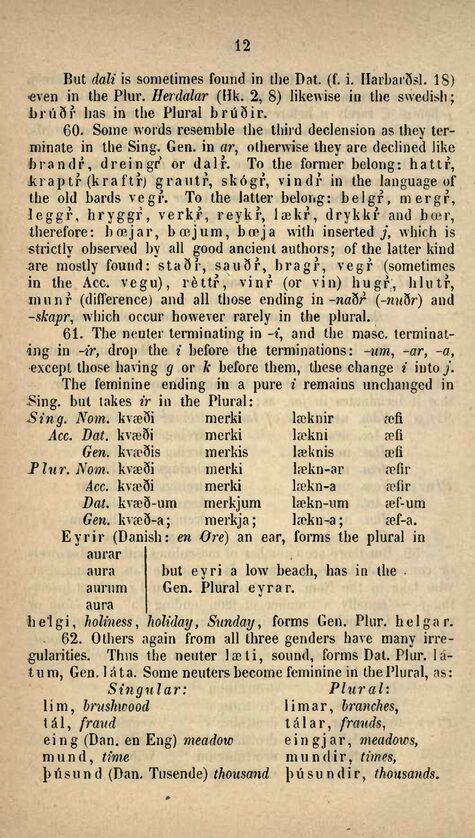
Full resolution (JPEG) - On this page / på denna sida - Part I - Inflection of Words - I. The Noun - IInd. Declension

<< prev. page << föreg. sida << >> nästa sida >> next page >>
Below is the raw OCR text
from the above scanned image.
Do you see an error? Proofread the page now!
Här nedan syns maskintolkade texten från faksimilbilden ovan.
Ser du något fel? Korrekturläs sidan nu!
This page has been proofread at least once.
(diff)
(history)
Denna sida har korrekturlästs minst en gång.
(skillnad)
(historik)
But dali is sometimes found in the Dat. (f. i. Harbarðsl. 18)
even in the Plur. Herdalar (Hk. 2, 8) likewise in the swedish;
brúðr̓ [[** her er begge tilbake, likeså i 60 og senere **]] has in the Plural brúðir.
60. Some words resemble the third declension as they
terminate in the Sing. Gen. in ar, otherwise they are declined like
brandr̓, dreingr̓ or dalr͗. To the former belong: hattr̓,
kraptr̓ (kraftr̓) grautr̓, skógr̓, vindr̓ in the language of
the old bards vegr̓. To the latter belong: belgr̓, mergr̓,
leggr̓, hryggr̓, verkr̓, reykr̓, lækr̓, drykkr̓ and bœr,
therefore: bœjar, bœjum, bœja with inserted j, which is
strictly observed by all good ancient authors; of the latter kind
are mostly found: staðr̓, sauðr̓, bragr̓, vegr̓ (sometimes
in the Acc. vegu), rèttr̓, vinr̓ (or vin) hugr̓, hlutr̓,
munr̓ (difference) and all those ending in -naðr̓ (-nuðr) and
-skapr, which occur however rarely in the plural.
61. The neuter terminating in -i, and the masc.
terminating in -ir, drop the i before the terminations: -um, -ar, -a,
except those having g or k before them, these change i into j.
The feminine ending in a pure i remains unchanged in
Sing, but takes ir in the Plural:
| Sing. | Nom. | kvjæði | merki | læknir | æfi |
| Acc. Dat. | kvæði | merki | lækni | æfi | |
| Gen. | kvæðis | merkis | læknis | æfi | |
| Plur. | Nom. | kvæði | merki | lækn-ar | æfir |
| Acc. | kvæði | merki | lækn-a | æfir | |
| Dat. | kvæð-um | merkjum | lækn-um | æf-um | |
| Gen. | kvæð-a; | merkja; | lækn-a; | æf-a. | |
| aurar | | | | | | | but eyri a low beach, has in the Gen. Plural eyrar. |
| aura | ||
| aurum | ||
| aura |
| Singular: | Plural: |
| lim, brushwood | limar, branches, |
| tál, fraud | tálar, frauds, |
| eing (Dan. en Eng) meadow | eingjar, meadows, |
| mund, time | mundir, times, |
| þúsund (Dan. Tusende) thousand | þúsundir, thousands. |
<< prev. page << föreg. sida << >> nästa sida >> next page >>